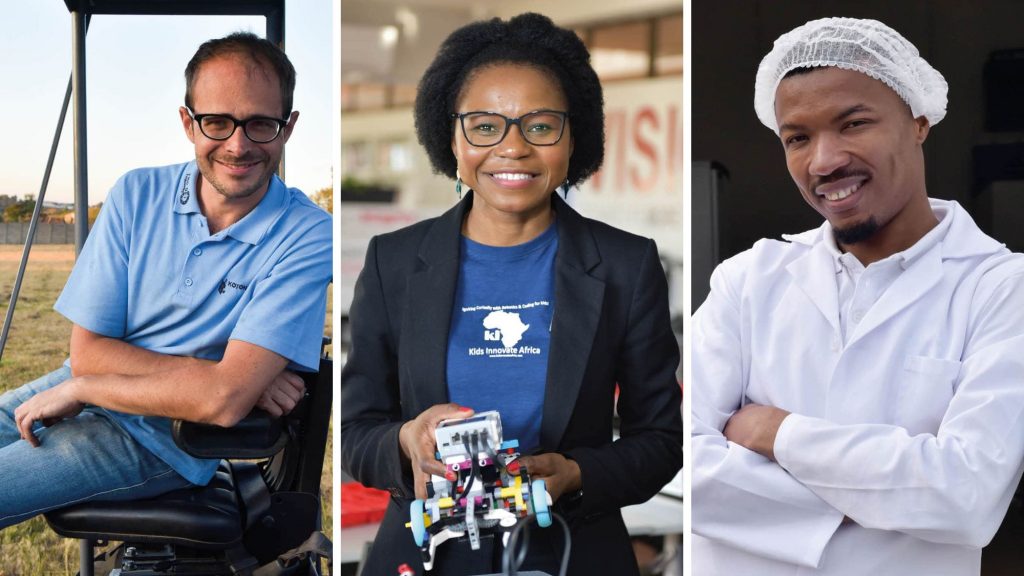South Africa’s esports scene is set for a major showdown as Hyprop and MTN introduce SHIFT COD, a Call of Duty tournament forming part…
24 entrepreneurs hand-picked for empowerment awards

Africanize, marketing and food delivery service for informal kitchens and restaurants in South African townships, is among the 24 start-ups set to benefit from over R18 million (about $1 million) in prize money in the Social Innovation and Disability Empowerment Awards. The awards are presented annually by the SAB Foundation in partnership with the Technology Innovation Agency (TIA), a government-led initiative.
Winners will be announced on Tuesday, 11 October 2022.
According to a media release, winners will invest the prize money in their businesses and also benefit from a mentorship programme. The awards place a particular emphasis on innovations that benefit women, youth, persons with a disability or those living in rural areas.
Africanize was started in Cape Town by Gcina Ntsonga, Siba Nombebe, Siphe Ntlemeza, and Khaya Dlova. Through a digital platform, the start-up supports small-scale food entrepreneurs in getting their products in and out of township to urban areas and also vice versa.
SAB Foundation innovation specialist Itumeleng Dhlamini says, judging from the entries, 2022 is a year that represents resilience, revival and growth. “Through their innovations, our finalists have unlocked exciting opportunities to scale and grow their businesses, and have the potential to create employment opportunities,” she explains.
“These entrepreneurs tackle challenges such as access to education for persons with disabilities, renewable energy solutions, access to specialist healthcare services in vulnerable communities and agriculture.”
As part of its annual Social Innovation and Disability Empowerment Awards, organisers also introduced a new category known as the SAB SHARP Awards. This targets innovators, social entrepreneurs, institutions, students, researchers and social enterprises with innovative ideas or prototypes that empower women in at-risk communities.
“We were really inspired by the entrepreneurs who are committed to making a positive impact in the lives of women in our country,” says Zoleka Lisa, SAB’s corporate affairs vice-president for South Africa. “We look forward to rewarding the five finalists and seeing them develop their innovations even further.”
Lisa says to make a sustainable change, the SAB Foundation offers ongoing mentorship and business support. It prides itself in providing a continuous journey of support for the entrepreneurs who participate in its programmes.
“We take mentorship seriously and ensure that our innovators are provided with the necessary guidance through each new phase that they enter into with their business,” concludes Dhlamini. “We encourage South Africans to be part of this positive change and continue innovating simple solutions to improve the lives of everyday citizens.
The complete list of finalists are:
Disability Empowerment Awards
- Breede Valley APD Business Units by Louine Griessel from Worcester, Western Cape. A platform that provides personal and professional growth and skills training for persons with disabilities.
- Disability Info South Africa by Alan Dowey from Cape Town, Western Cape. A digital portal that provides easy access to information, opportunities and guidance for persons with disabilities.
- iSchool Africa by Chelsea Williamson from Johannesburg, Gauteng. A disability inclusion programme that empowers deaf youth with digital skills. This 10-month skills development programme empowers youth with disabilities by providing them with training in technological skills.
- Maretlagadi Welfare Centre by Elvis Seroka from Limpopo. A centre that provides a safe space and offers skills development for children with disabilities in rural Limpopo.
- Robotics with Neurodiverse by Emma Mpahlele from Cape Town. A teaching programme that develops the untapped potential of neurodiverse students using Lego robotics education and coding.
- Spectrum Chefs Academy by Cheryl Terblanche from Cape Town. A culinary skills development centre that provides training for learners with a disability to build their confidence and self-worth.
- Uku’hamba Prosthetics and Orthotics by Sibongile Mongadi from Soweto, Gauteng. Technology that produces high-quality, affordable prosthetics and orthotics for amputees and persons with disabilities.
SAB Foundation Social Innovation Awards
- Addressdox by Tsholofelo Ramokoka from Rustenburg, North West. A digital platform that supplies people from rural communities with no formal address with a proof of residence document.
- Africanize by Gcina Ntsonga from Cape Town. A web-based marketing and food delivery service for informal kitchens and restaurants in township communities.
- Certified Organic dried herbs and agricultural training by Sam Serumula from Polokwane, Limpopo. An organic processing facility which supplies dried herbs and other medicinal plant material.
- Cloudy Deliveries by Colin Mkosi from Langa, Western Cape. A bicycle delivery service for local restaurants and supermarkets in townships.
- Digital Farming Platform by Tumi Frazier from Alberton, Johannesburg. A mobile application that provides emerging farmers with access to educational agricultural content in their ethnic language.
- Fire Killa Extinguishers by Bryan Moulang from Port Elizabeth, Eastern Cape. A polymer-based non-pressurized, recyclable and reusable fire extinguisher designed to combat the threat of fires in informal settlements.
- From Waste to Value by Thuso Motau and Abram Motau in Johannesburg. A recycling initiative that converts used cooking oil into quality soap bars that are available to low-income communities.
- Green Grid Building by Molebogeng Motlanthe from Polokwane. A solution that converts shipping containers into low cost houses with off-grid utility system.
- Homeless Home Project by Dr Nobs Mwanda and Toni Rothbart in Johannesburg. A multipurpose clothing item that doubles up as a sleeping bag, a lightweight jacket, and a crossbody bag for displaced individuals.
- iKhaya Lekhaya by Ben Nkuna in Cape Town. A provider of prefinance and a facilitator between the privates sector and underserve areas to upgrade informal homes.
- Kotonki by Liz Moynihan from Roodepoort, Johannesburg. A low-cost utility vehicle that assists emerging rural farmers in performing their daily tasks.
- Making Healthy Easy by Maxi-Lee Machado and Xoliswa England from Ballito, KwaZulu-Natal. A fruit and vegetable agroprocessing enterprise that makes healthy products easily accessible to all.
- Mfanex Water by Khulekani Mpanza from Eshowe, KwaZulu-Natal. An online water factory shop that offers a door-to-door water re-filling and ice delivery service in rural areas.
- Mind Blown Game by Viroshen Chetty and Nireshnee Chetty from Durban, KwaZulu-Natal. A collectible cards interactive mobile game with topics aligned to the STEM syllabus.
- RDL Health by Andile Nonyane from Johannesburg. Providers of medical facilities for specialists offering quality healthcare services in township communities.
- Sari for Change by Rayana Edwards from Johannesburg. A sustainable fashion project that enables women to become self-sufficient through recreating new garments from recycled saris.
- Smart Food Growing Technologies by Andrew Pott from Johannesburg. A self-watering flat-packable vegetable growing box that enables individuals to grow vegetables in small spaces.
SAB SHARP Awards
- Izipho Zokuphila Tracking by Simphiwe Ntuli and Siyabonga Mgadi from Durban. A service that provides protection through the use of traceable fashion accessories. This innovation aims to provide personal protection services using trackable fashion accessories designed for women and children. The wearables incorporate a geolocation device and panic button that is linked to a 24-hour response security service. Should its client feel unsafe or falls victim to a crime, they can contact the emergency response team by using the panic button on their device.
- KasiFlavor App by Mlamuli Mavundla from Durban. A mobile application that supports fast food outlet owners in township communities to expand their customer base. This newly developed application is focused on simplifying the ordering and delivery of fast food in township communities. It provides a platform for women-owned fast-food outlets to market and sell their products online and customers can order their food after downloading the app and get it delivered.
- Production of biochar to boost food security by Thandiwe Mchunu from Durban. A farming project that converts weeds, cut grass, fallen leaves, harvest waste and alien plant into organic fertiliser. This agricultural innovation converts plant matter into a nutrient rich, organic fertiliser for farmed crops. The aim is to provide farms with organic fertiliser so that farmers are able to grow their products to meet the market standard size for vegetables.
- The Cleaning Fix by Joshua Cox from Cape Town. A digital solution that provides dignified work opportunities for mothers from low-income communities. This online platform connects unemployed women to domestic work opportunities. It enables people in need of cleaning services to view profiles of cleaners in their local area which they can book and pay online. This unique booking service pays 100% of its fee to the cleaner and clients can pay extra towards transport.
- Village Garden Fresh by Lefentse Chapman from Polokwane. An innovation that empowers women to grow their own vegetable gardens and sell their produce. This project provides seedling production, planting, pesticide management and crop cycle specialised training for women in rural communities to grow their own vegetables. These women receive a starter pack containing compost, planter boxes, seedling trays, seeds, a gardening tool set, a hosepipe with attachments, greenhouse netting and plant food.
Set up in 2010 as one element of the broad-based black economic empowerment transaction conducted by South African Breweries, the SAB Foundation is an independent trust that annually invests millions of Rands towards developing entrepreneurship in South Africa and the benefit of the wider South African community.
The SAB Foundation was the first organisation in the country to received tax exemption.
ALSO READ: Meet the 60 black-founded start-ups now funded by Google

